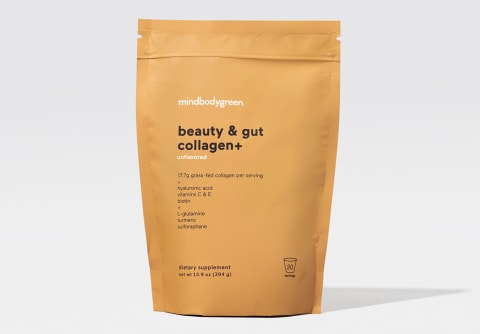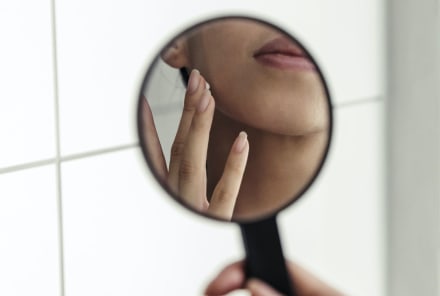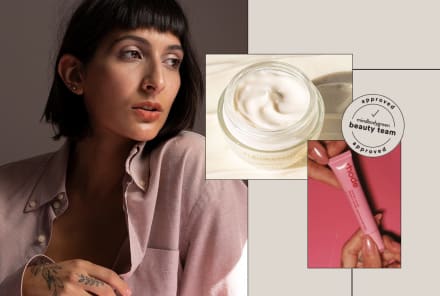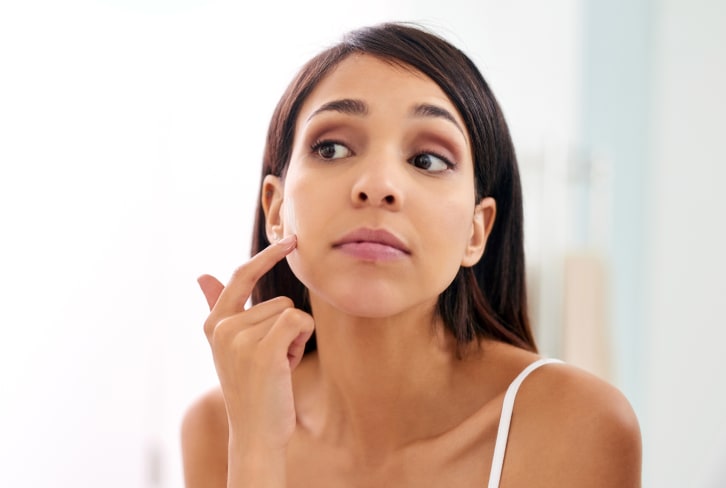Advertisement
Tune In: An Internal Medicine Physician & Aesthetic Specialist On Her Skin Health Priorities


Today's guest on the Clean Beauty School podcast specializes not only in integrative medicine but also in the high-tech world of aesthetics.
This combination makes internal medicine physician Glenicia Nosworthy, M.D., a fascinating person to talk to because her recommendations aren't just about what new treatment to try—but how to optimize your results through diet and lifestyle.
"I think the two [health and beauty] go hand in hand. From aesthetics, internal medicine, dermatology, plastic surgery, if you're not healthy, it will reflect in your skin and affect your quality of life," she says.
Here, three takeaways from the episode. But be sure to tune in to the episode to hear the entire conversation.
Feed your body the right nutrients to get better ROI
Sure, you can get the latest facial and slather on the most expensive face cream, but those things won't be as effective if you're not taking care of your body at the same time.
The same goes for aesthetic treatments: "When we are doing aesthetic treatments that are increasing collagen and elastin production, you have to consider, what do cells need to make collagen and elastin?" asks Nosworthy. "They need great forms of nutrients and proteins. These are the building blocks of DNA, cells, and molecules."
For example, collagen-boosting treatments and injectables are popular tools to help rejuvenate the skin and smooth wrinkles. But to produce collagen, the body must have an adequate supply of amino acids and other building materials.
"To make collagen and elastin, I can inject you with anything that's going to stimulate the cell. But if the cell is not getting the nourishment or the nutrients that it needs to function properly, then your response is going to be very minimal," she says. "And you're going to be paying for multiple treatments and you're not going to get maximum results."
So, if you're considering getting any sort of aesthetic treatment, think about how your lifestyle and diet play a role in those outcomes.
mbg POV:
Vitamin D plays a role in skin health
When we think about all the vitamins and nutrients that play a role in our skin health, vitamin D likely doesn't come to mind first. The "sunshine vitamin"—as it's often called—is better known for its role in bone health, for example.
However, it can play a role in skin health. In fact, one randomized controlled trial in the journal Nutrients found a relationship between vitamin D insufficiency and dry skin1: Researchers discovered that participants with lower vitamin D levels also had lower average skin moisture.
While more research is needed on the intersection of vitamin D and skin health, it's a promising area. And anecdotally, Nosworthy has seen a big difference in the health of her patients.
"That marriage of internal and external medicine is really important. For example, I had a patient who came in with a complaint of dark under-eye circles. We were in the process of doing an under-eye PRF treatment but hadn't started it yet. First, I recommended she take a vitamin D supplement. Within two weeks after taking the vitamin D supplement, when she came in to get the PRF, I noticed the darkness under her eyes had gotten better. In fact she noticed it first. She said, 'Look at my under-eyes. My skin and under my eyes are so much brighter and more even.'"
Eventually, they went on to do the aesthetic treatment alongside the supplementation—and in the end, the results were greater than the sum of their parts.
"She was thrilled from the vitamin D alone, but we went ahead and did the PRF treatment in addition to it," she said. "But just from dealing with that vitamin deficiency, it was a game changer for her. I think getting blood work done is really important when there could potentially be other things that are leading to an aesthetic result that you're not happy with."
Editor's note:
Stick to the basics for day-to-day
As Nosworthy explains, what she does daily is minimal. "I think the minute you start to add too many things and make it too complicated is when you end up with skin irritation," she says.
But she does have some key ingredients and products she loves using, which you'll see are some of the classics: a gentle cleanser, vitamins C and E, hyaluronic acid, and a lipid-rich moisturizer.
"I always use a gentle cleanser. I don't use anything too stripping or [that] has an acid in it. I keep it very, very mild," she says. This is important because it keeps the skin barrier integrity strong, without which the body can't deal with environmental stressors and inflammation.
"For serums, I use hyaluronic acid or an antioxidant serum with ferulic, vitamins C and E in it as well," she says. "It just helps deal with the free radicals and damage from UV rays."
Then she tops it off with a rich moisturizer. "This is important because about two or three times a week, I'll use a retinol at night," she says. "This helps my skin tolerate the ingredient. I don't have any dryness or irritation."
And as for how she decides what products she's using on a given day: "And there's no strict routine. It's kind of just what my skin's doing and what I feel it needs at that time," she says. "You just kind of like to listen to it and make decisions accordingly."
Tune in:
For more insights, listen to our entire conversation here:
Watch Next
Enjoy some of our favorite clips from classes
Enjoy some of our favorite clips from classes
What Is Meditation?
Mindfulness/Spirituality | Light Watkins
Box Breathing
Mindfulness/Spirituality | Gwen Dittmar
What Breathwork Can Address
Mindfulness/Spirituality | Gwen Dittmar
The 8 Limbs of Yoga - What is Asana?
Yoga | Caley Alyssa
Two Standing Postures to Open Up Tight Hips
Yoga | Caley Alyssa
How Plants Can Optimize Athletic Performance
Nutrition | Rich Roll
What to Eat Before a Workout
Nutrition | Rich Roll
How Ayurveda Helps Us Navigate Modern Life
Nutrition | Sahara Rose
Messages About Love & Relationships
Love & Relationships | Esther Perel
Love Languages
Love & Relationships | Esther Perel



















